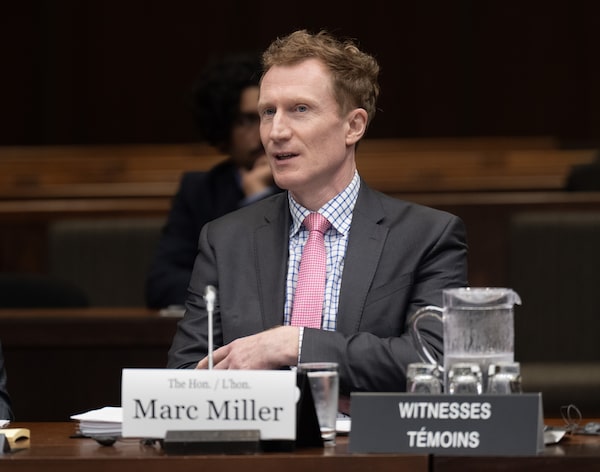
Immigration, Refugees and Citizenship Minister Marc Miller waits to appear before the Standing Committee on Citizenship and Immigration, on Feb. 28, in Ottawa.Adrian Wyld/The Canadian Press
Immigration Minister Marc Miller has reimposed visa requirements for Mexicans visiting Canada following a sharp rise in asylum claims from that country, most of which have been rejected, and concerns about abuse of the system.
But the change to the visa rules has heightened tensions with Mexico, which says it reserves the right to react reciprocally.
The policy shift follows calls on Ottawa from Quebec Premier François Legault to act to slow the influx of refugees to the province, and to reimpose visa requirements for Mexicans visiting Canada. There has been a surge in asylum claims from Mexicans since the requirement was lifted in 2016.
“Any adjustments to Canada’s travel requirements are made to preserve the integrity and sustainability of our asylum and immigration system,” Mr. Miller said at a news conference Thursday. “Most asylum claims from Mexico are either rejected by the Immigration and Refugee Board of Canada or withdrawn or abandoned by the applicant, and so the change was needed.”
Mr. Miller took the unusual step of making the visa requirement for Mexicans come into effect the same day as it was announced to make sure people do not have a chance to “game the system.”
He said the decision follows months of talks with Mexican officials and that he had personally spoken to Mexico’s Foreign Minister about the change. Mexicans holding U.S. visas will continue to be able to come to Canada without a visa, and the change will not affect Mexicans with a valid study or work permit allowing them to live in Canada.
The minister admitted that Mexico was not happy with Canada’s decision but said he had not received any indication there would be trade repercussions.
“I want to be clear we place great importance on our close ties with Mexico. Mexico will remain an important partner for Canada,” he said.
However, Mexico’s Foreign Relations Secretariat expressed disappointment with the decision, saying in a statement that it “reserves, of course, the power to act reciprocally.” The statement was reposted to social media after being deleted Wednesday night.
President Andrés Manuel López Obrador said Thursday that “other options could have been found.” He offered a “fraternal and respectful reproach” to Prime Minister Justin Trudeau.
The President, at the previous day’s news conference, threatened to boycott the next North American Leaders’ Summit, alleging a lack of respect from the United States and Canada.
“We’ve acted generously with them, with the Prime Minister Trudeau’s government, but now they’re on the brink of applying a unilateral measure, precisely now that there are elections in Mexico,” Mr. López Obrador said.
“We have always treated Canadian and U.S. authorities with respect. We don’t deserve this mistreatment or the staining of Mexico’s prestige or that of its authorities.”
Campaigning for Mexico’s June 2 presidential election kicks off on Friday.
Mr. Miller said Canada will expand visa application centres in Mexico. He also indicated that the reimposition of visas may not be permanent. It could be revised if there is a significant decline in the numbers of Mexicans coming to Canada and claiming asylum, and if Mexico takes steps to address factors making Mexicans want to come here. He also suggested that Mexico would first need to address the problem of false passports being used to enter Canada and the involvement of criminals to get people here.
Dan Anson, head of investigations and intelligence at the Canada Border Services Agency, told The Globe and Mail in a recent interview that people with links to organized crime may be involved in smuggling Mexicans to Canada and on to the U.S.
The reimposition of visas follows concerns about a significant number of Mexicans flying to Canada without a visa as a way of reaching the U.S. though our border, Mr. Miller said.
Some Mexicans are “gaming the system by coming into Canada because they couldn’t get into the U.S. and then transitioning into America,” he said. “That’s something we have to manage as a partner with the U.S.”
The numbers crossing into the U.S. from Canada have increased dramatically in the last year or two, he said, although they remain far lower than Mexicans crossing into the U.S. through its southern border.
Security at the Canada-U.S. border has become a minor political issue in this U.S. presidential election year.
Vivek Ramaswamy, an erstwhile candidate for the Republican presidential nomination, proposed building a wall along the border. “We’ve got to just skate to where the puck is going, not just where the puck is. Don’t just build the wall, build both walls,” he said in one debate last November.
Ahead of New Hampshire’s Republican primary last month, Nikki Haley told reporters she supported the idea. “If that’s what it takes to keep them out, we will do a wall,” she said.
The number of “encounters” by U.S. Customs and Border Protection at the Canadian border jumped from 27,180 in 2021 to 189,402 last year. The number is still small, representing a little more than 6 per cent of the countrywide total, and the number of Mexican nationals is smaller still: 11,121 last year.
But it has been enough to attract attention. In October, New Hampshire Governor Chris Sununu announced a tenfold increase in state trooper patrols in the area.
David Agren is Special to The Globe and Mail